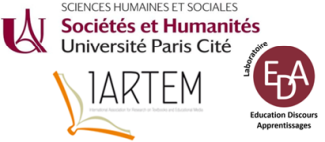Consultation of Pedagogical Resources and Success in Distance Education
How can we characterize success in distance education and the utilization of documentary resources? Is frequent course consultation a source of success? Are there study methods with documents that promote success?
To outline responses to these questions, an analysis of quantitative data from OpenClassrooms was conducted. OpenClassrooms is a French online education company that offers exclusively online paid courses. Students can enroll at any time and progress at their own pace. Learning is individualized. OpenClassrooms also distinguishes itself from ordinary distance education as it involve several hundred students concurrently. Ultimately, these courses lead to a diploma. To succeed in OpenClassrooms courses, it is necessary to complete a certain number of projects. For each project, video courses are accessible in an open-access catalog and serve as resources for task completion. Mentors assist students in project completion. Once a project is finished, a defense is organized with a jury. Projects must be completed sequentially.
Since autumn 2020, OpenClassrooms has collaborated with us to study student dropout rates in their courses. The overarching goal was to produce indicators and insights on ways to mitigate dropout rates in online courses offered by OpenClassrooms. To produce a dynamic visualization of student flows and understand their trajectories in the course, a specific dataset was generated. For the course titled "Pedagogical Responsible Engineer," eight data extractions were performed from January to July 2023. During the January extraction, 315 students were involved, and 560 for the July last extraction. This enabled us to conduct a data analysis characterizing student pathways and evolution in the course. Three databases were produced for each extraction. One specifically relates to this research, containing 8 variables describing students' usage of courses (courses consulted, number of chapters...) and 2622 rows indicating course consultations for the 560 July students.
To ascertain if a student is succeeding in the distance education program, we calculated an indicator of evolution speed. Since students are free to progress at their own pace and must complete eight projects sequentially, it is possible to distinguish them by evaluating their project completion speed. This allows us to differentiate successful students and cross-reference this variable with the consulted resources. Thus, we can infer the influence of resource consultation on course success.
Three-quarters of the students in the database are female. Median and mean ages are around 39 years old, two-thirds of the individuals present in the database are job seekers, and approximately two-thirds hold a bachelor's or master's degree. On average, students consult 5 courses. Half of the courses are consulted for less than 30% of their content, which corresponds to an average of 4 chapters. Students have access to the entire course catalog, meaning all courses from all programs, but unsurprisingly, the 12 most consulted courses are those dedicated to the program. As students approach the end of the program, they consult approximately 35 course materials at most. This suggests that excessive course consultation indicates difficulties. In other words, successful students who reach the end of the program have not consulted the courses more than 35 times.
References
Atif, A., Richards, D., Liu, D., Bilgin, A.A., 2020. Perceived benefits and barriers of a prototype early alert system to detect engagement and support ‘at-risk' students: The teacher perspective. Computers & Education 156, 103954. https://doi.org/10.1016/j.compedu.2020.103954
Chibaya, C., Whata, A., Madzima, K., Rudolph, G., Verkijika, S., Makhoere, L., Mosia, M., 2022. A scoping review of the “at-risk” student literature in higher education. https://doi.org/10.1101/2022.07.06.499019
Kuzilek, J., Hlosta, M., Herrmannova, D., Zdrahal, Z., Vaclavek, J., Wolff, A., 2015. OU Analyse: analysing at-risk students at The Open University. Learning Analytics Review LAK15-1, 1–16.
Wolff, A., Zdrahal, Z., Nikolov, A., Pantucek, M., 2013. Improving retention: predicting at-risk students by analysing clicking behaviour in a virtual learning environment, in: Proceedings of the Third International Conference on Learning Analytics and Knowledge, LAK '13. Association for Computing Machinery, New York, NY, USA, pp. 145–149. https://doi.org/10.1145/2460296.2460324
Zhang, L., Rangwala, H., 2018. Early Identification of At-Risk Students Using Iterative Logistic Regression, in: Penstein Rosé, C., Martínez-Maldonado, R., Hoppe, H.U., Luckin, R., Mavrikis, M., Porayska-Pomsta, K., McLaren, B., du Boulay, B. (Eds.), Artificial Intelligence in Education, Lecture Notes in Computer Science. Springer International Publishing, Cham, pp. 613–626. https://doi.org/10.1007/978-3-319-93843-1_45
- Poster

 PDF version
PDF version

